Hotspot Shield and NordVPN are undoubtedly some of the most popular VPN providers in 2025. We’re talking about providers with some innovations behind them, such as in-house VPN protocols and solid performance that ended up being a part of their image.
While Hotspot Shield is a US-based provider, NordVPN resides in Panama, a more privacy-friendly jurisdiction. Does that mean that, in this Hotspot Shield vs NordVPN duel, the latter wins? Well, not necessarily, as this is just a small part of the equation.
Today, we have a serious task on our hands. We’ll compare these two providers side by side across 9 comprehensive and in-depth tests to see which one is better. You’ll see streaming tests, speed tests, security/privacy comparisons, and a pricing comparison at the very end.
If you’re not sure which VPN to buy between Hotspot Shield and NordVPN, I don’t blame you. Both providers offer everything you need to stay safe and secure online and in today’s duel, we’ll see if things on paper turned out to be true in practice. Without further ado, let the battle begin – may the better VPN win!
Hotspot Shield vs NordVPN: A Quick Verdict
If you’re in a hurry, NordVPN is the winner of today’s duel. Below, we list reasons for using both VPNs so that you have their advantages and disadvantages at a glance:
Use NordVPN for:
- 6,000+ servers worldwide
- Very fast speeds with NordLynx
- Threat Protection
- Double VPN servers
- Torrenting/Streaming optimization
- No-logging policy (audited)
- Apps for all devices
Use Hotspot Shield for:
- 45-day money-back guarantee
- Solid P2P performance
- Responsive customer support
Hotspot Shield vs NordVPN: Apps & Ease of Use
To start this NordVPN vs Hotspot Shield duel, we first need to talk about their applications and ease of use. NordVPN is known for superb device compatibility, ranging from typical desktop and mobile platforms to routers, Smart TVs, Fire TV Stick, and other non-typical devices.
In fact, I’d like to remind you that this is a great VPN for Kodi, so if you’re using this streaming application, know that NordVPN will work flawlessly. Hotspot Shield, surprisingly, offers pretty much the same experience when we talk about app support.
On its site, you’ll find apps for Windows, iOS, Android, Linux, macOS, and routers. Plus, both providers support browser extensions, although NordVPN is slightly better here due to more capable extensions for Firefox and Chrome.
In terms of simultaneous connections, the providers are very limited in my opinion. Hotspot Shield packs 5, while NordVPN goes with one above, 6. Neither is great in this regard and if you’d like more simultaneous connections, you can check Surfshark with unlimited or CyberGhost with 7 of them.
Hotspot Shield
Okay, so what about the ease of use? Let’s start with Hotspot Shield and its Windows app since it’s the most feature-rich. The screenshot below shows you how the app looks. It’s high-tech, modern, and intuitive, just as we like it, so there are no complaints in this regard.
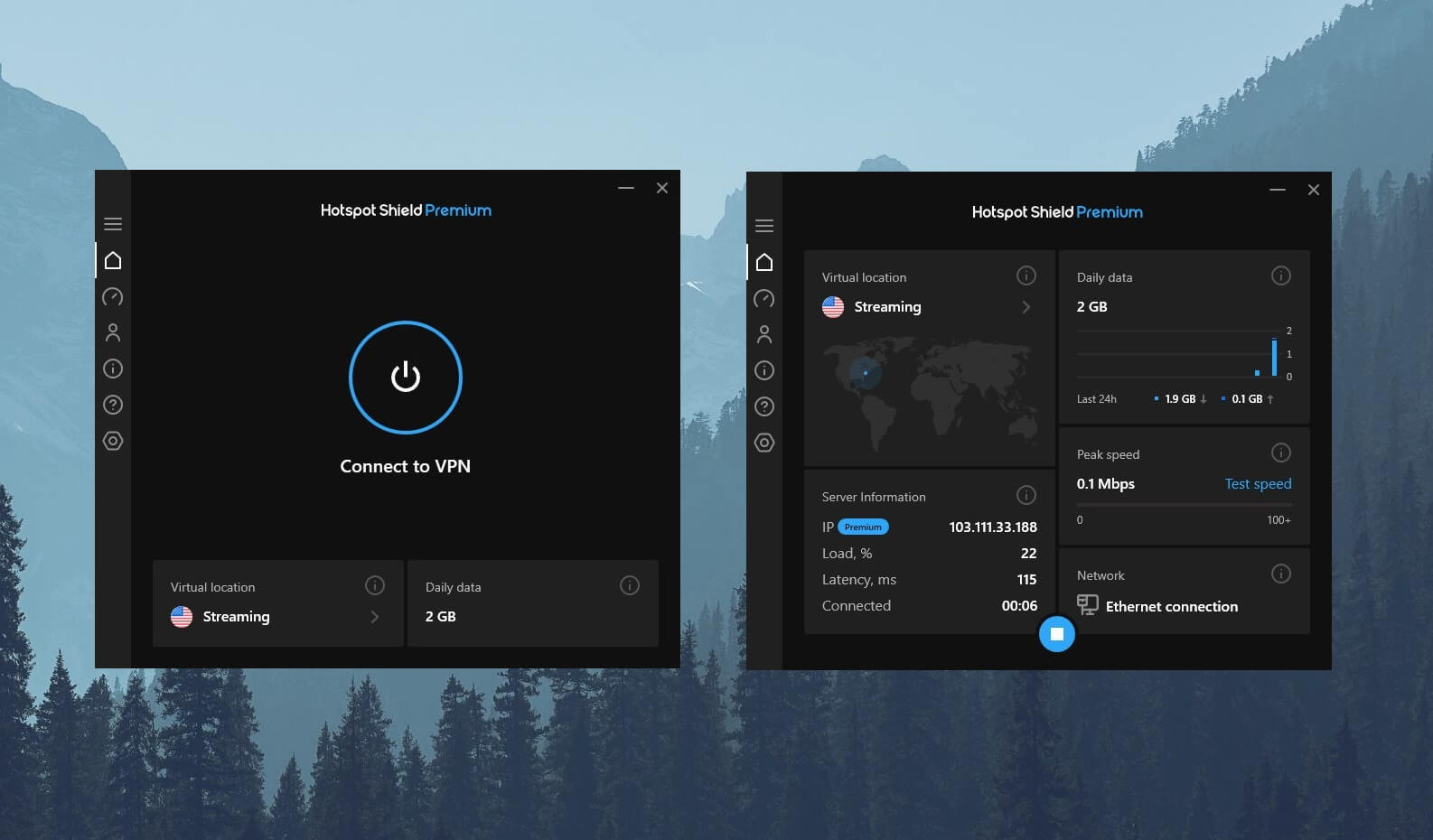
The app sports this dark theme and some people might dislike that you can’t switch to a lighter theme. However, I think it’s not an issue, as the app is very intuitive and each setting is accessible. The server list is opened by clicking on the country on the left, for example.
You can then see quick-access servers, dedicated servers, and all countries listed alphabetically. Connecting to a server takes about 3-4 seconds, which isn’t the quickest but far from the slowest. In the app, Hotspot Shield also has a speed test feature, allowing you to detect the fastest server.
The Settings menu is opened via the Gear icon, which is how you use any VPN. In this menu, you’ll find a kill switch, protocol selection, and all other features that you can access easily. The app has no bugs or issues with disconnects and stability – a welcome change from many cheap and low-quality VPNs.
Plus, its mobile apps resemble the Windows app almost one-to-one. With a similar layout, identical look, and almost the same set of features, users can enjoy the app regardless of their device.
NordVPN
If you thought NordVPN is any worse, you’re dead wrong. NordVPN has this beautiful world map that you can use to connect to a server. Also, there’s a server list on the left, which shows you all of the locations along with numerous specialty servers – more about them later in this NordVPN vs Hotspot Shield comparison.
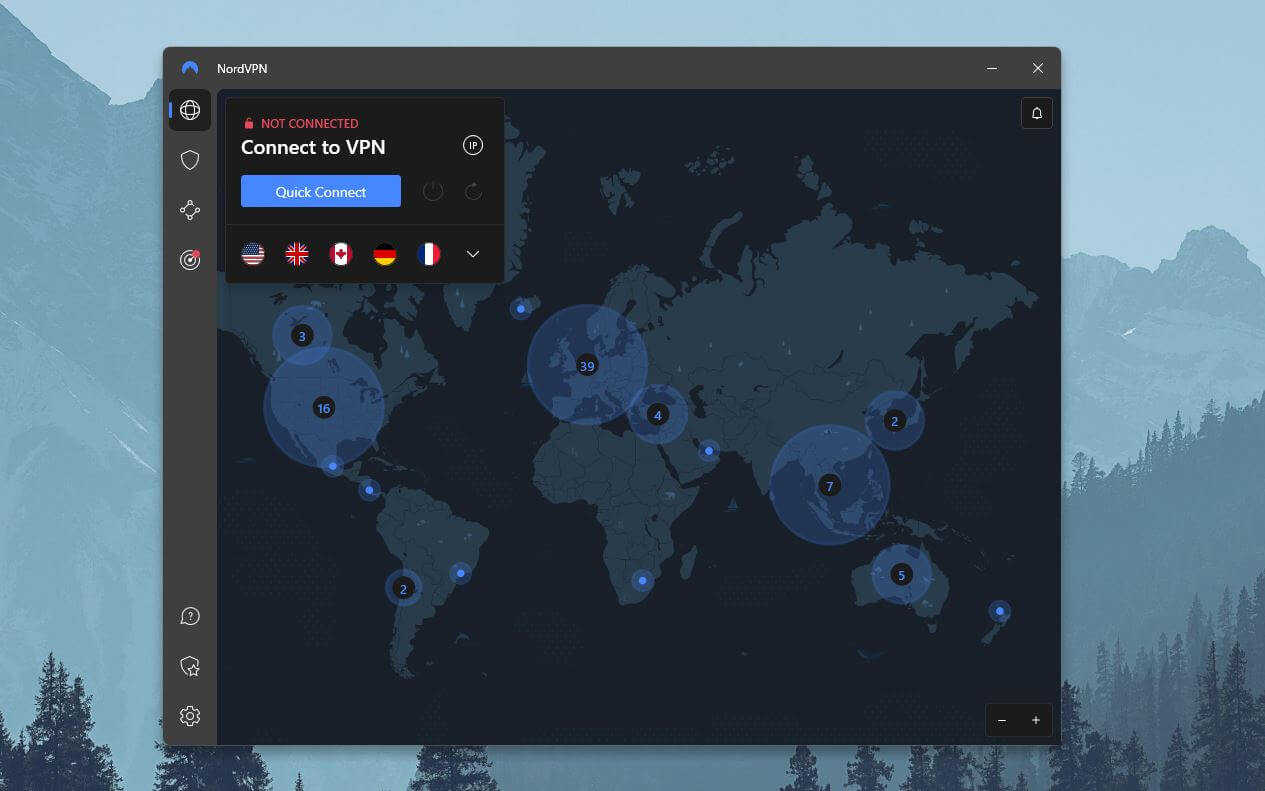
Overall, I like NordVPN more. It’s more customizable and allows you to switch to a light theme. On top of that, it allows for one-click connections with significantly shorter, almost instantaneous connection times which Hotspot Shield lacks.
Its features are located on the left and each feature is accessible with a single click of a mouse. For example, you can immediately access Dark Web Monitor from the home screen or connect to an obfuscated server. The latter makes it a great VPN to use in China or any other censored country.
NordVPN makes things simpler by pulling out the most important features in separate menus. This can be seen in Settings where each important feature has its own menu. You’ll find a kill switch, split tunneling, and various connection options in an instant.
This is further complemented by the app’s reliability, which means it won’t crash or lose the connection unexpectedly, as is the case with some free VPNs we tested. Once again, NordVPN feels a bit more “premium” and streamlined, although both providers are more than decent in this regard.
Who Wins?
The first round of the Hotspot Shield vs NordVPN comparison is a close one. However, NordVPN WINS due to having slightly better device support, one more simultaneous connection, and better-looking, more customizable apps for all platforms.
Security & Privacy: Which One Is Safer to Use?
People who know us know that we extremely appreciate VPN’s security and privacy. Despite their names, many VPNs fail to provide their users with these commodities and they cheat by offering weaker encryption, storing logs, and whatnot.
Is this the case with these two providers? Well, how about we see that now, huh?
Security Features
Let’s first talk about the security features of these providers. Since we’re comparing two VPNs, you should expect them to have some similarities. It’s like comparing two cars – they both have four wheels, so some similarities must be present.
Hotspot Shield and NordVPN offer 256-bit encryption – the strongest one – along with a kill switch, split tunneling, IP leak protection, and proprietary, albeit different protocols. As you can see, both services are very feature-rich, although there are some major differences even in these “same” features.
What Are the Differences?
For the start, NordVPN comes with a two-level kill switch. This VPN kill switch can work on the system level or be applied to particular apps that won’t go online if the VPN connection is lost. Hotspot Shield’s kill switch works only on the system level, so it’s less advanced from the get-go.
Moving on, NordVPN’s proprietary protocol is NordLynx. NordLynx is a WireGuard-based protocol with extremely fast speeds, hasty connection times, and rock-solid security. Hotspot Shield has this Catapult Hydra protocol developed by AnchorFree or Pango – its owner.
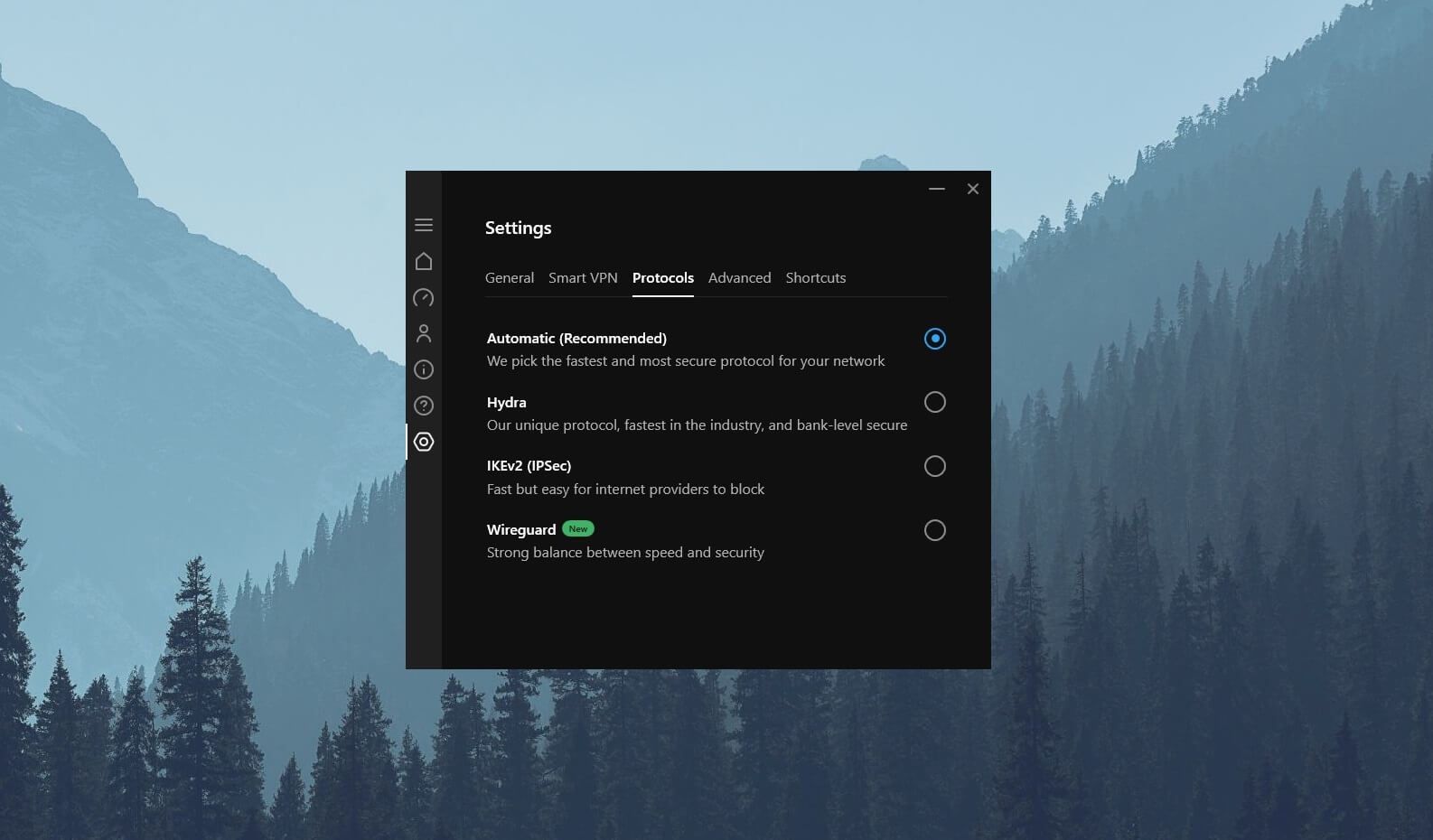
This protocol should be great for bypassing firewall restrictions thanks to the OpenVPN TLS base. Since we’re talking about Hotspot Shield, we should mention its WireGuard and IKEv2 support, whilst NordVPN supports “only” OpenVPN and NordLynx.
However, that’s all when it comes to Hotspot Shield. NordVPN has many more tricks on its sleeve, such as a proprietary DNS service, RAM-based servers, and even a Dark Web Monitor for protecting your sensitive personal data online.
Meshnet is a feature you won’t find in any other VPN. It’s here for hosting and joining private LAN parties, which makes this provider great for gaming or business users. That’s not all! The provider offers the so-called Threat Protection bundle.
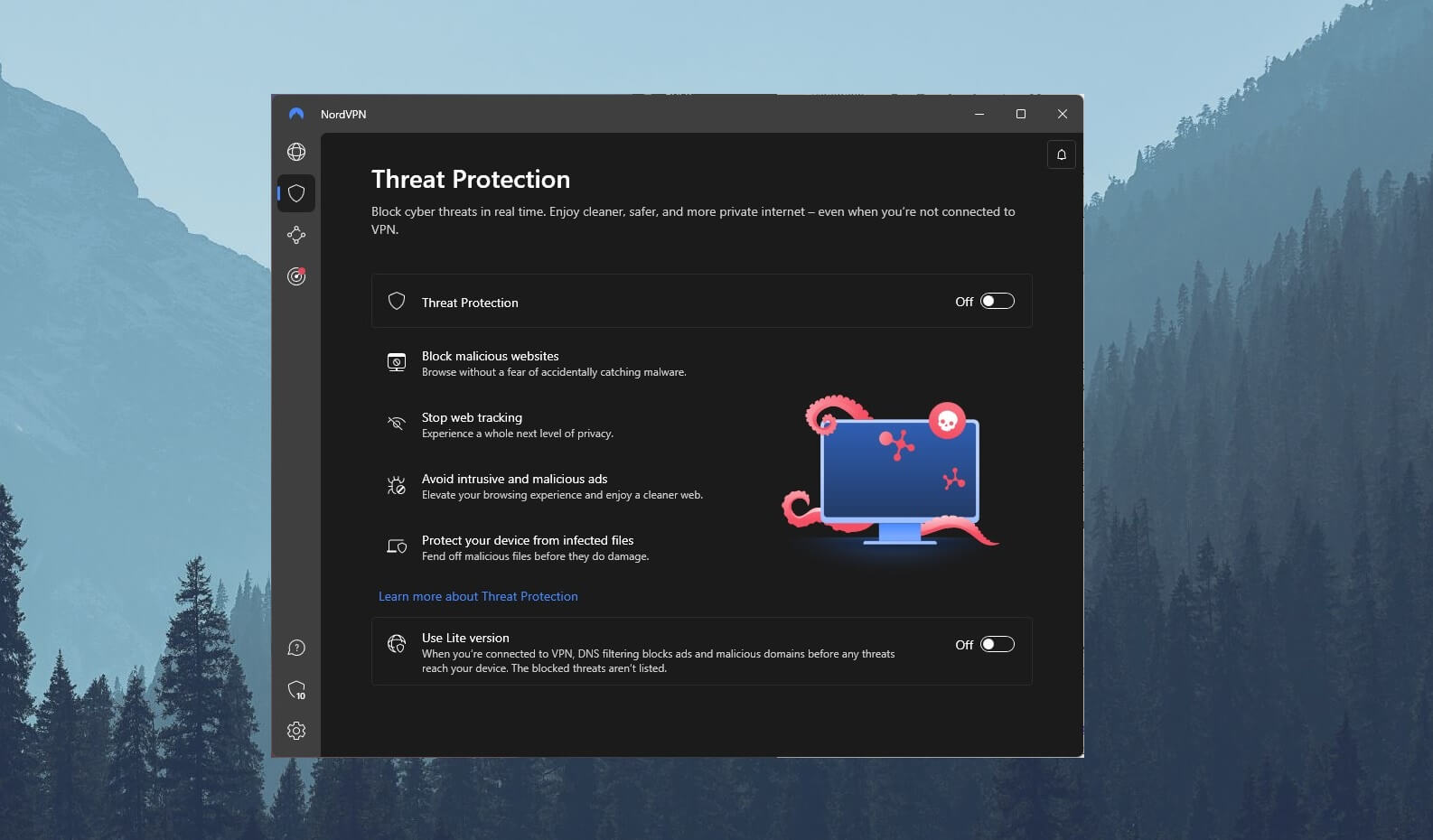
It consists of malware and virus protection plus CyberSec, an ad-blocker, which Hotspot Shield lacks. Aside from that, NordVPN allows you to use a custom DNS server if you want and it can automatically protect you on untrusted WiFi networks, which its rival can do as well.
Another feature worth mentioning is called Double VPN. Double VPN servers are pairs of servers designed to double your encryption by routing your IP through two servers in different countries. Coupled with other security features, they’re excellent at preserving your anonymity.
In this NordVPN vs Hotspot Shield duel, we can see that the Panamanian provider is far more feature-rich and offers some unique functionalities you won’t find anywhere else. But what about privacy? Can we expect a different result?
Is There a No-Logs Policy?
This time, I want to start with the American provider, Hotspot Shield. In my full review of Hotspot Shield, I stated that this service is based in the United States. As you know, this isn’t a privacy-friendly jurisdiction and is known for global surveillance, data collection, data sharing, and other malicious practices.
As such, it sets a poor base for a service that should respect your privacy and be a trustworthy VPN that stores no logs. Unlike Private Internet Access which is the best provider in this country, Hotspot Shield actually resorts to intrusive logging which we found extremely disappointing.

If you check its privacy policy, you’ll see that Hotspot Shield stores some logs in an anonymized form. That is okay, but it’s not okay when the information in question is related to connection logs, your IP address, and even the domains you visit!
This means the provider stores logs of your BROWSING HISTORY but makes it benign by saying it’s not storing full names of the sites you visit and similar things. Not to mention its free version that’s even worse, as it uses targeted ads and third-party advertisers to follow you online.
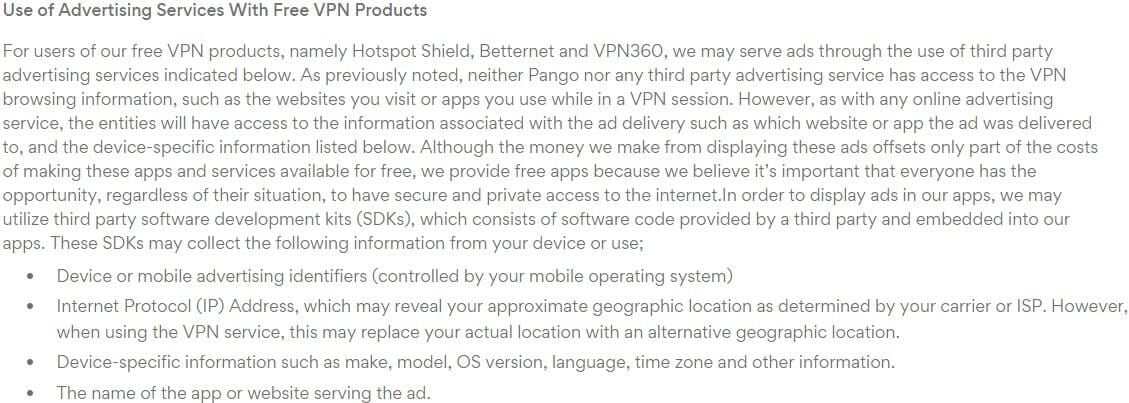
You can see that its free version stores your IP, geolocation, mobile identifiers, OS version, and many more bits of data. With this in mind, it’s easy to qualify Hotspot Shield as an unsafe, insecure, and borderline dangerous provider to use, especially with a US jurisdiction behind it.
NordVPN is different from Hotspot Shield. The provider resides in Panama, a privacy-friendly country with no data-retention laws to ruin the experience. Its no-logging policy has two security audits from PwC, so you can be sure that everything you read is 100% checked and verified.
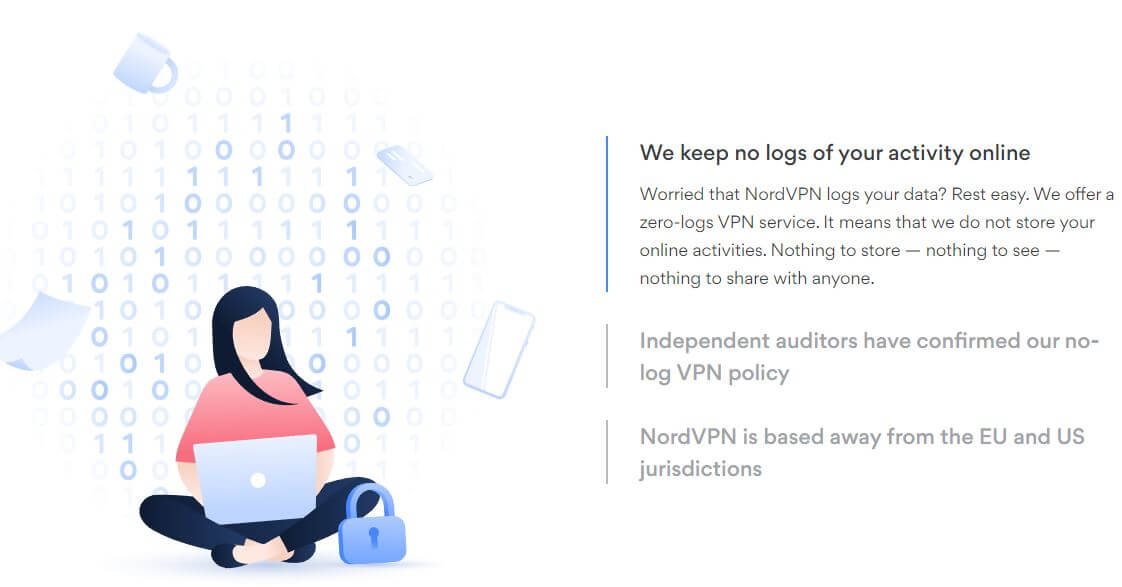
In short, NordVPN stores no logs of browsing activities, IP addresses, DNS requests, geolocation, and other compromising bits of data. The information that it stores revolves around your payment method, email, and similar things that are necessary for the service to function.
If we factor in RAM-based servers that wipe each bit of information with each restart, we can conclude that privacy is the #1 priority of this VPN. Any authority that checks NordVPN’s servers for user data will find them empty, as no such information is stored.
Who Wins?
This round of comparison has a clear winner. NordVPN WINS effortlessly by offering more security features, a certified no-logging policy, and a privacy-friendly Panamanian jurisdiction. Hotspot Shield is not going to respect your privacy and for this reason alone, you should avoid it at all costs.
Hotspot Shield vs NordVPN Streaming Test
Are you still interested in our full Hotspot Shield vs NordVPN comparison? Let’s talk about streaming then. At first, Hotspot Shield seems like a great VPN for streaming due to special servers for this purpose. However, these servers aren’t located in many worldwide countries.
At the time of writing, I found streaming servers in the UK and the US only, which, at least for me, isn’t enough. NordVPN has no special streaming servers and at first, it seems disappointing, but in practice, I found NordVPN to be better overall!
Yes, Hotspot Shield’s streaming servers work with the majority of popular services in the aforementioned countries. It can also be used as an Apple TV VPN to unblock geo-restricted services effortlessly. NordVPN can do the same – and more.
I noticed that the Panamanian provider is a bit more reliable overall and I think it’s because all of its servers are streaming-friendly. Hotspot Shield isn’t impressive once you go out of the “dedicated streaming” regions and it fails to unblock Japanese and Canadian services, for instance.
With NordVPN, I rarely had those issues, as the provider blasted through everything I tested. It works with streaming services, foreign TV channels, and even online bookies, even though these aren’t streaming websites.
As for the quality of the experience, Hotspot Shield and NordVPN are on par with each other. You’ll be able to enjoy 4K footage where it’s possible and that has to do with the proprietary protocols that both providers offer. NordLynx and Hydra are indeed great for these scenarios.
Who Wins?
In this Hotspot Shield vs NordVPN streaming test, NordVPN WINS. It’s going to unblock more geo-restricted services and provide blazing-fast speeds for enjoying a variety of video content online. Hotspot Shield is also great in this regard but is overshadowed by a superior rival.
Hotspot Shield vs NordVPN Speed Comparison: Which One Is Faster?
An important part of the NordVPN vs Hotspot Shield duel is the speed test. We all hate slow VPNs that cripple your connection and make it slow and sluggish. That’s why I appreciate ExpressVPN, which is currently the fastest provider your money can buy.
If you’ve read my ExpressVPN vs NordVPN comparison, you know that the latter is extremely close. This, logically means, that Hotspot Shield is a bit slower. But how slower? Let’s see. For the start, I need to talk about my testing parameters and prerequisites.
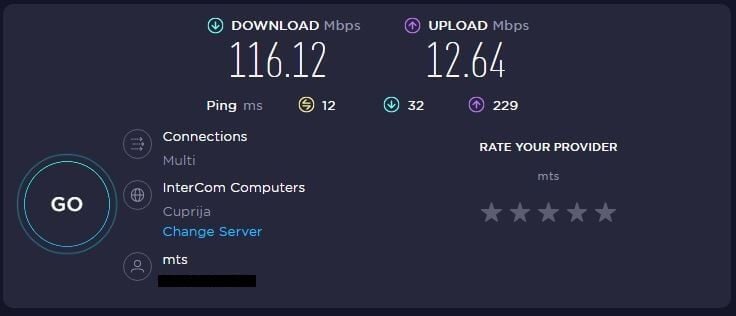
The screenshot you see above shows my native internet speeds when I’m not using a VPN. As you can see, it’s around 120 Mbps download and around 13 Mbps upload speeds. Not too fast but also not too slow. By the way, I’m located in Eastern Europe which is also important to mention.
During my speed tests, I use a combination of near and distant servers, although I like to test distant servers more, as they show the true capability of a VPN service. Thus, I tested the servers in the UK, the US, Australia, and Japan for 3 days straight, 3 times a day.
With both providers, I set the protocol option to Automatic just to make sure they decide on the best protocol for me. This is especially important because they don’t offer the same protocols, in which case, it’s always better not to touch this option to get accurate results. You can see them below.
Hotspot Shield
UK:
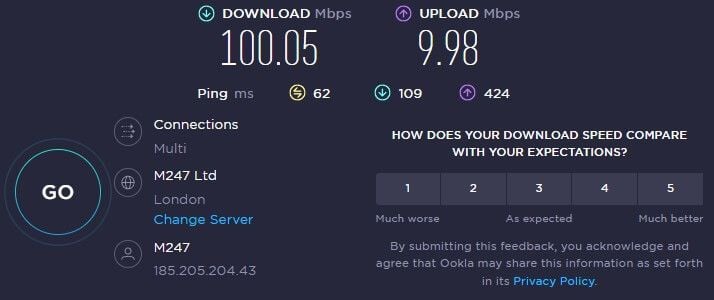
US:
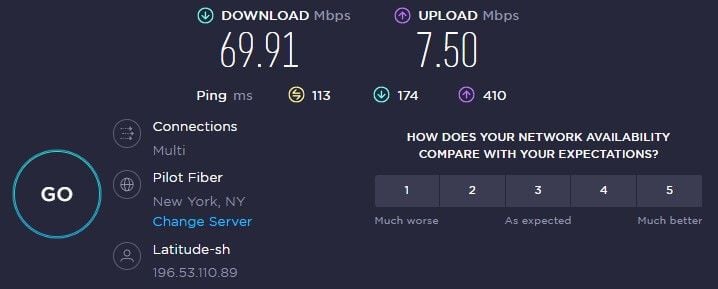
Australia:
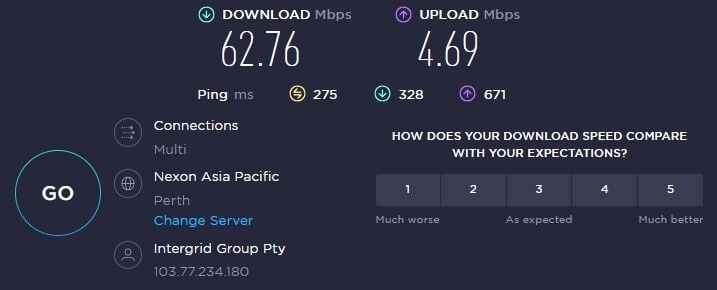
Japan:
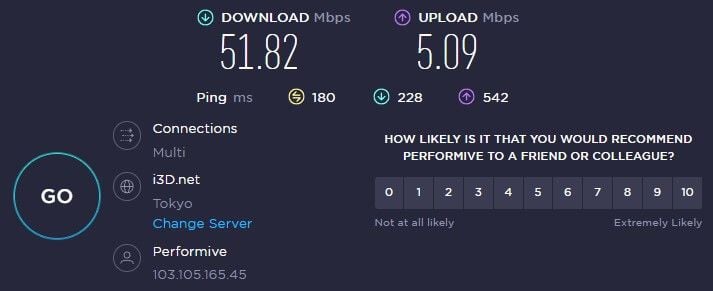
NordVPN
UK:
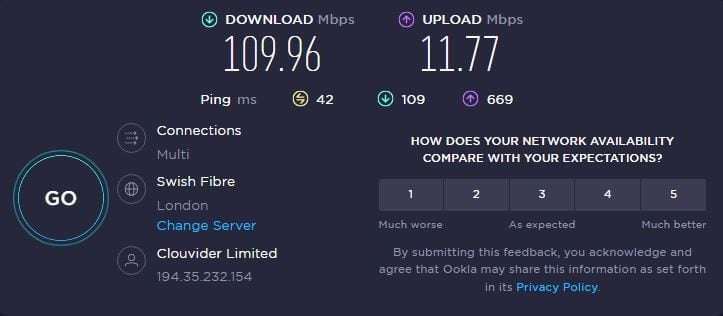
US:
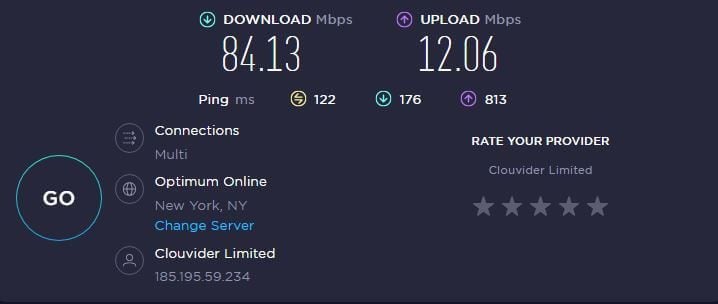
Australia:
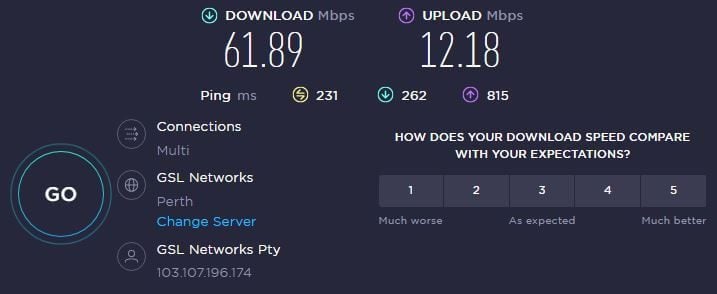
Japan:
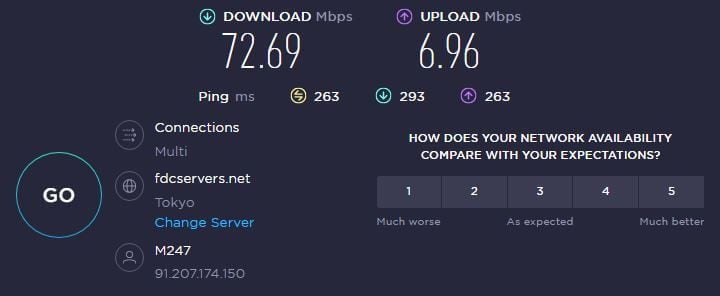
Who Wins?
At the end of this round of the battle, NordVPN WINS once again. Judging by the speed test results, we can see that NordVPN is a lot faster than Hotspot Shield, which is especially prevalent on servers in the UK, Japan, and the US.
Australian servers showed similar download speeds, for example, but even on this server, NordVPN displayed significantly better upload speed and slightly lower ping. That said, the Panamanian provider wins even this round, resulting in no points for its American rival just yet.
Torrenting: Are Hotspot Shield and NordVPN P2P-Friendly?
Downloading torrents is one of the most popular activities people use a VPN for. While free providers are rarely suitable for something like this, premium providers are known for offering P2P-optimized servers for fast and reliable torrenting.
Hotspot Shield doesn’t have dedicated P2P servers but its entire fleet works when you’re trying to download torrents. I conducted this test using a random server and tried to download Linux Mint using my torrent client, which ended up in success.
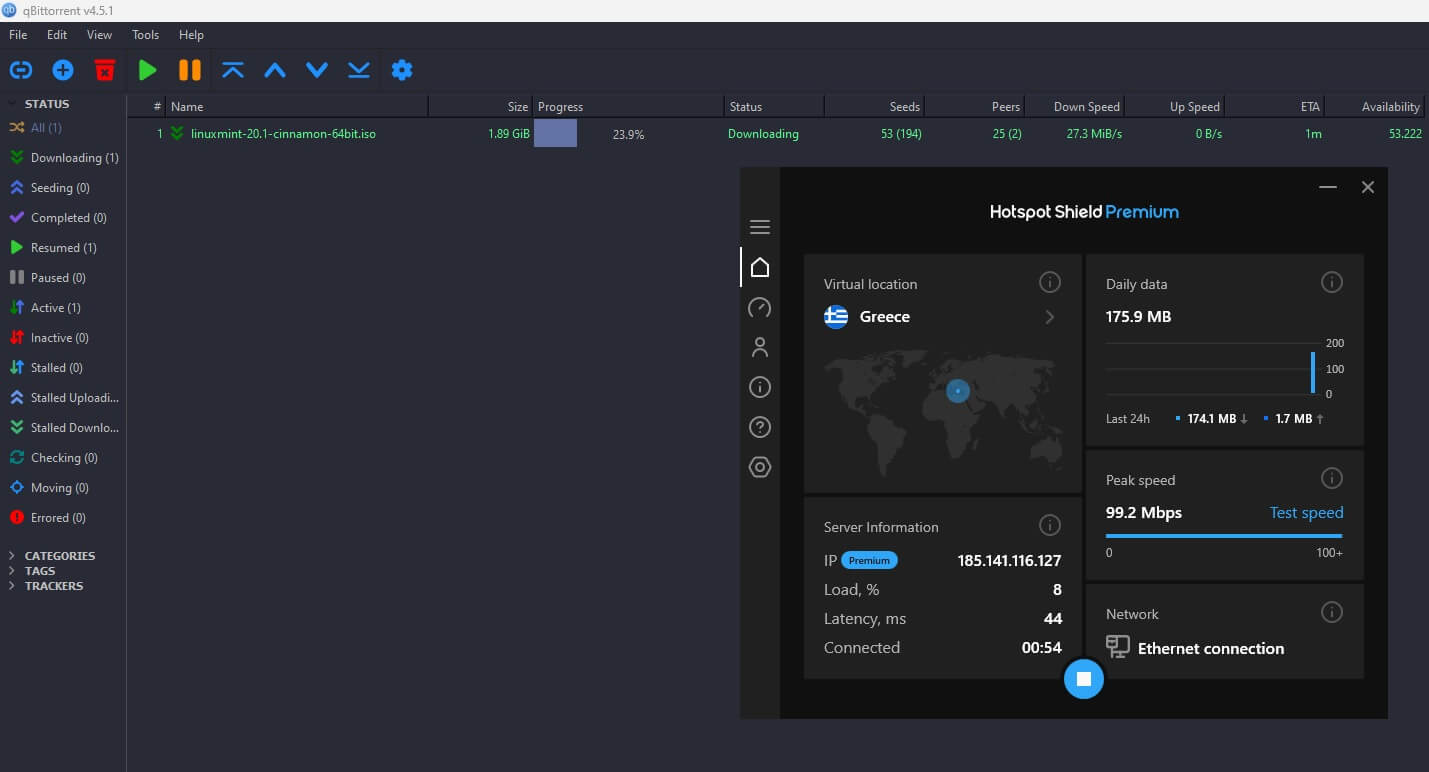
Hotspot Shield is, therefore, P2P-friendly but I’m not sure how smart it is to use it for torrenting in countries that frown upon this activity. Remember that the provider stores anonymized logs of your IP and the domains you visit, which means your torrenting activities could also be logged.
Also, Hotspot Shield keeps your IP address on its servers for as long as the session is active, so you better hope it doesn’t get compromised during that time. From the torrenting standpoint, we can say it works but these “little” quirks should make you think twice before using it.
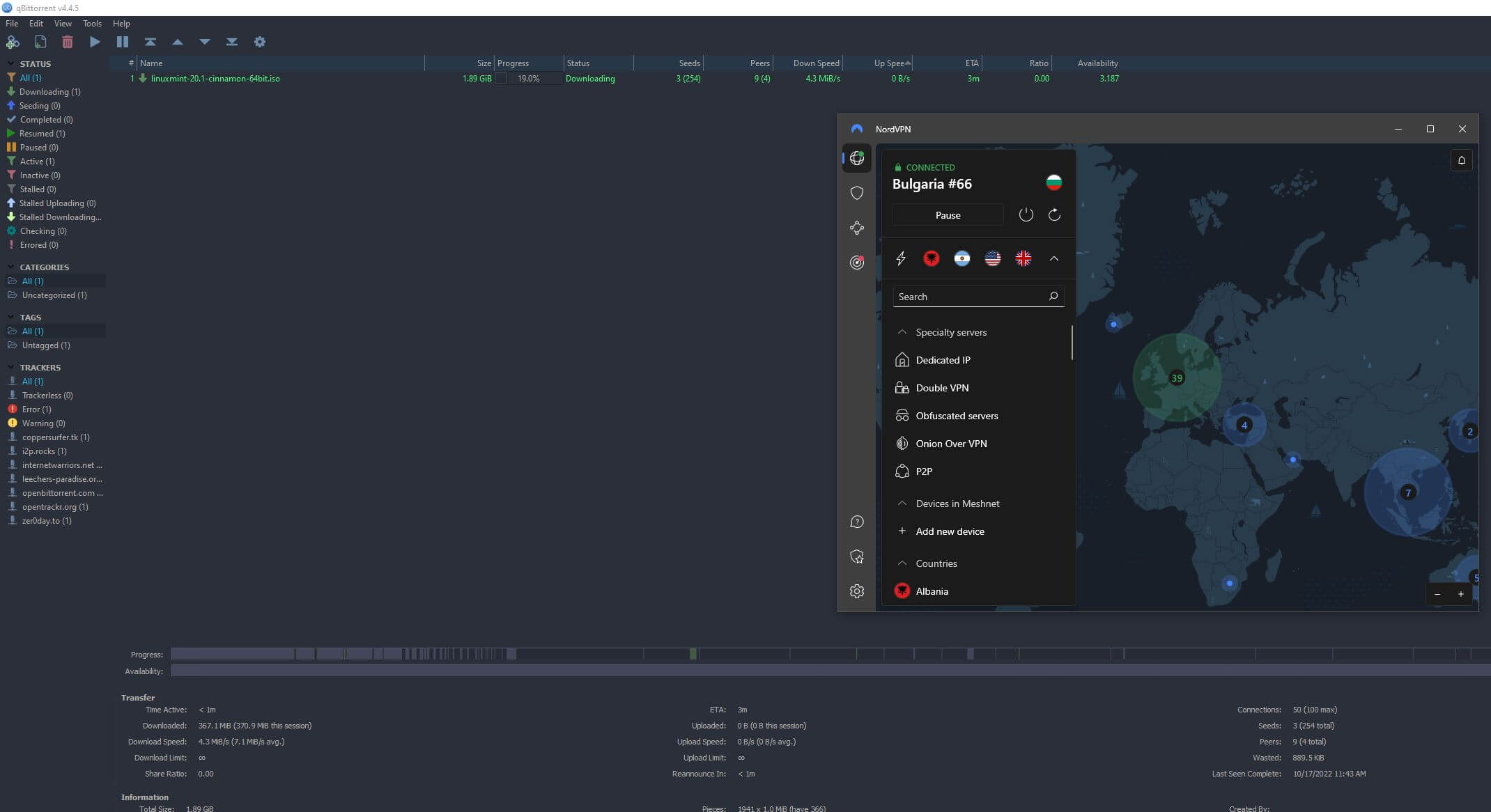
On the other hand, we have NordVPN which has P2P servers on the list. They’re based in dozens of worldwide locations, so you can find the one close to you for fast torrenting. And since the provider stores absolutely no logs and is very secure, P2P activities are enjoyable.
Best of all is that you get access to P2P even outside of these servers. Every server allows for torrenting but if you want to maximize the performance you get, using dedicated servers for this activity is always better. Either way, you’ll make no mistake if you decide to use NordVPN for this purpose.
Who Wins?
Sadly for Hotspot Shield, NordVPN WINS this round of the battle. It’s a better VPN for P2P because it has a no-logging policy and doesn’t store any compromising user information. Hotspot Shield provides excellent torrenting performance but at the cost of your privacy, which is never a good deal.
Are NordVPN and Hotspot Shield Working in China?
In terms of bypassing censorship, this Hotspot Shield vs NordVPN should be interesting. I mean, NordVPN has obfuscated servers that use OpenVPN TCP while its rival has this Catapult Hydra protocol based on OpenVPN TLS.
Both providers claim to be great at bypassing firewall restrictions but are they capable of bypassing the Great Firewall of China? Let’s start with NordVPN. This service is renowned for working in a huge array of censored countries, even those like Iran, Russia, Turkey, the UAE, and of course – China.
Its obfuscated servers are incredibly reliable and during our tests, we had no issues with them. Our acquaintances in China use NordVPN daily and 10/10 times, this provider works flawlessly, allowing for great performance and fast speeds despite obfuscation and stronger encryption.
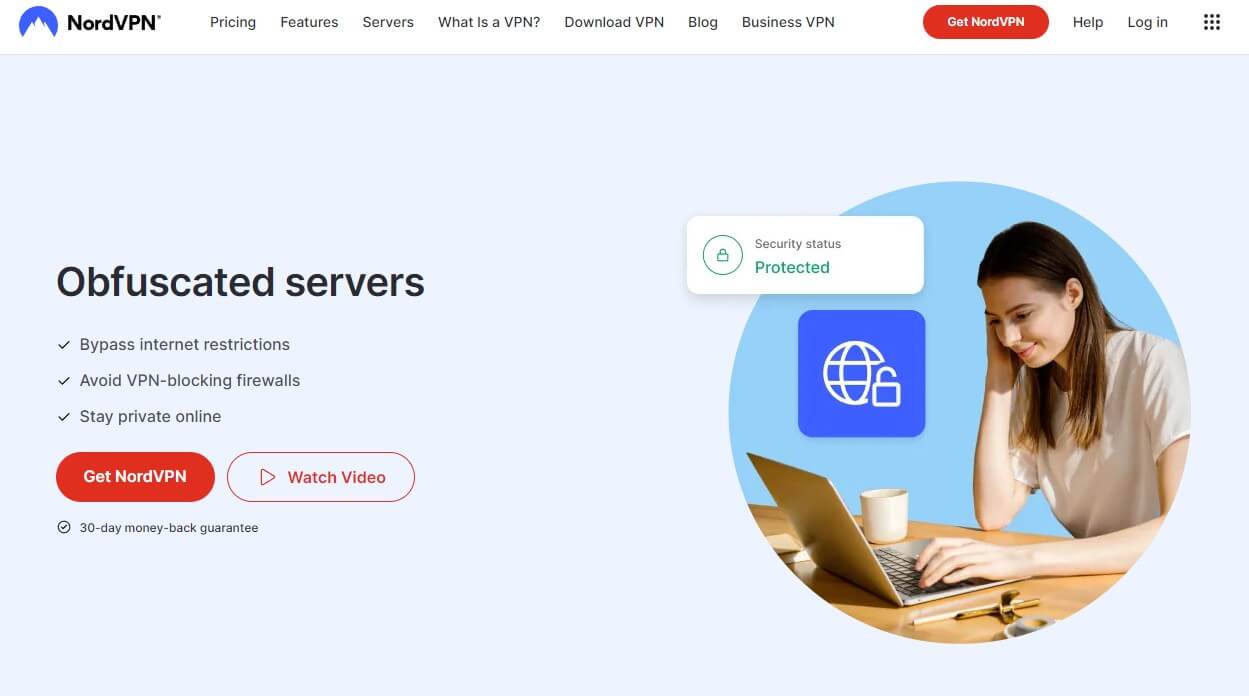
Now, Hotspot Shield isn’t completely useless, although it’s pretty close to it. Our testers reported that it worked in China on a few occasions. On average, they say it’s working 2/10 times and when it does, the performance isn’t particularly jaw-dropping.
This is possible through the use of Catapult Hydra, while WireGuard and IKEv2 protocols won’t work. On the good side, Hotspot Shield is going to work in the UAE and Turkey, or even Russia if you want. These are less censored countries that still represent a challenge for some providers.
Since China is the most “problematic”, let’s say, we’re more interested in this country. And as we had the chance to see, NordVPN is more reliable, along with providers like ExpressVPN and Surfshark. It looks like Hydra still isn’t up to the task and needs improvement.
Who Wins?
This one’s pretty clear. NordVPN WINS by being significantly more dependable in China and many other censored countries. It’s a reputable VPN for privacy that you can use anywhere thanks to amazing obfuscated servers that mask your VPN connection properly.
Hotspot Shield vs NordVPN Server Fleets: Which One Is Bigger?
With a big server park, VPNs want to focus on bringing better performance through less overcrowding. Also, having a large server network ensures you have lots of countries and locations to pick from which is beneficial for bypassing geo-blocks, torrenting, and accessing streaming services.
Hotspot Shield (3,200 servers in 80 countries)
Hotspot Shield is not a small VPN by any means. At the time of doing this comparison, it has 3,200 servers in more than 80 countries and 35 cities. I’m sure this number will go up in the future, as the provider already increased its server park a few times.
For comparison, ExpressVPN has 3,000 servers in 105 countries, so this provider is pretty close. The server distribution is excellent and you get a perfect combination of virtual and physical servers. Even less popular countries are covered, with the majority of servers being in the US.
Usually, there’s one location per country but some countries, like the aforementioned US, the UK, Canada, Italy, Australia, and others have 2 or more locations. Furthermore, Hotspot Shield has one location in India and you get a server even in Argentina, which isn’t so common these days.
In terms of server variety, there are gaming and streaming servers. You don’t get torrenting servers, as said. I just don’t like that the entire network is comprised of 1 Gbps servers, which is a far cry from the 10 Gbps servers we get in more “opulent” VPNs if I can call them that.
NordVPN (6,000+ servers in 61 countries)
One of these “opulent” VPNs is NordVPN. NordVPN has 6,000 servers in 61 countries – one number is smaller than Hotspot Shield. The good news is that these are 10 Gbps, RAM-based servers, so their quality is higher than that of its rival.
This provider offers a solid server variety, as well. In the US alone, it pumps out nearly 2,000 servers but you get other locations in the UK, the UAE, Canada, and many servers across Europe. Much like Hotspot Shield, NordVPN comes with a few virtual locations, which is nothing to worry about.
Alas, the provider still doesn’t offer an Indian VPN location which could’ve been fixed with these virtual servers. Nevertheless, the server variety is better here, as you get several types of servers, such as:
- Obfuscated
- P2P
- Double VPN
- Onion Over VPN
- Dedicated IP
Yes, the provider allows you to even get a dedicated IP in the US, Australia, Sweden, Germany, Japan, and a few other countries. This feature isn’t available in Hotspot Shield, which is why NordVPN perfectly justifies its premium status in this industry.
Who Wins?
This NordVPN vs Hotspot Shield round of comparison is very tough. Hotspot Shield offers more countries and server locations, while NordVPN offers more servers, better variety, and a dedicated IP address in a dozen or so countries. Having faster 10 Gbps servers and a more varied server fleet, we’d say that NordVPN WINS.
Customer Support: Hotspot Shield or NordVPN?
Customer support isn’t the most important thing for me but if it’s not great, it’s easy to get disappointed. The good thing in this Hotspot Shield vs NordVPN 2025 comparison is that both providers excel. They both offer 24/7 live chat support and email support for those less chatty.
In both cases, I encountered fast and helpful responses and I had no issues chatting, asking questions, and poking around for additional information. Speaking of that, you can expect numerous help guides, FAQs, and other stuff in their Help centers.
NordVPN, in particular, offers a YouTube channel as well, and although it’s not the most active, you’ll find some great video tutorials and explanations. Hotspot Shield’s Help Center is excellent too and I was pleasantly surprised with their router setup guides, for instance.
You get everything you need support-wise, and in many cases, you won’t even have to contact these VPNs to resolve the issue you had. It’s enough just to go to the Help center, find the guide you need, and fix the problem yourself – splendid!
Who Wins?
This round of comparison is a DRAW. Both services excel in customer support by providing insightful answers and offering support through live chat and email, 24/7/365.
Pricing Comparison: How Cheap Hotspot Shield and NordVPN Are?
The final NordVPN vs Hotspot Shield comparison for today, although we already know the winner, is the pricing comparison. Hotspot Shield and NordVPN are premium providers but one advantage of the first is that it offers a free plan. In theory, it’s an advantage.
In practice, it’s not, because it’s one of the worst free providers due to intrusive logging, limited bandwidth, and only one server location in the US. You can check our list of the best free VPNs for Windows if you’d like, where we talk about some stellar choices that also work on all other platforms.
Hotspot Shield
For now, since I’m talking about Hotspot Shield, let’s see how much will you pay for it.
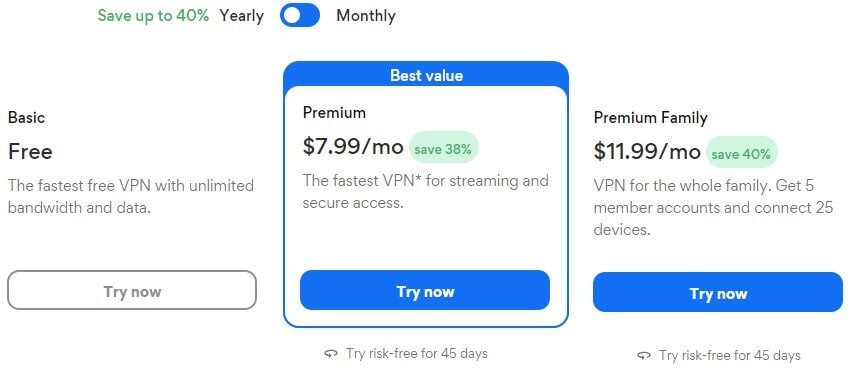
The provider offers 3 types of plans. The free plan, the Premium plan, and the Premium Family plan. The one in the middle is most likely going to be your choice if you’re crazy enough to pay $7.99/mo for a service that isn’t up to par with NordVPN.
Remember that this is the annual plan, so you’re paying upfront what seems to be a price of around $100 – you do the math. The Premium Family plan is even more expensive but it offers 25 simultaneous connections, which is the only difference.
Hotspot Shield has a 45-day money-back guarantee which is a relief, alas, you can’t pay using crypto, which is a minus for users who prefer anonymity over anything else.
NordVPN
Now, let’s see if NordVPN is any cheaper than its rival.
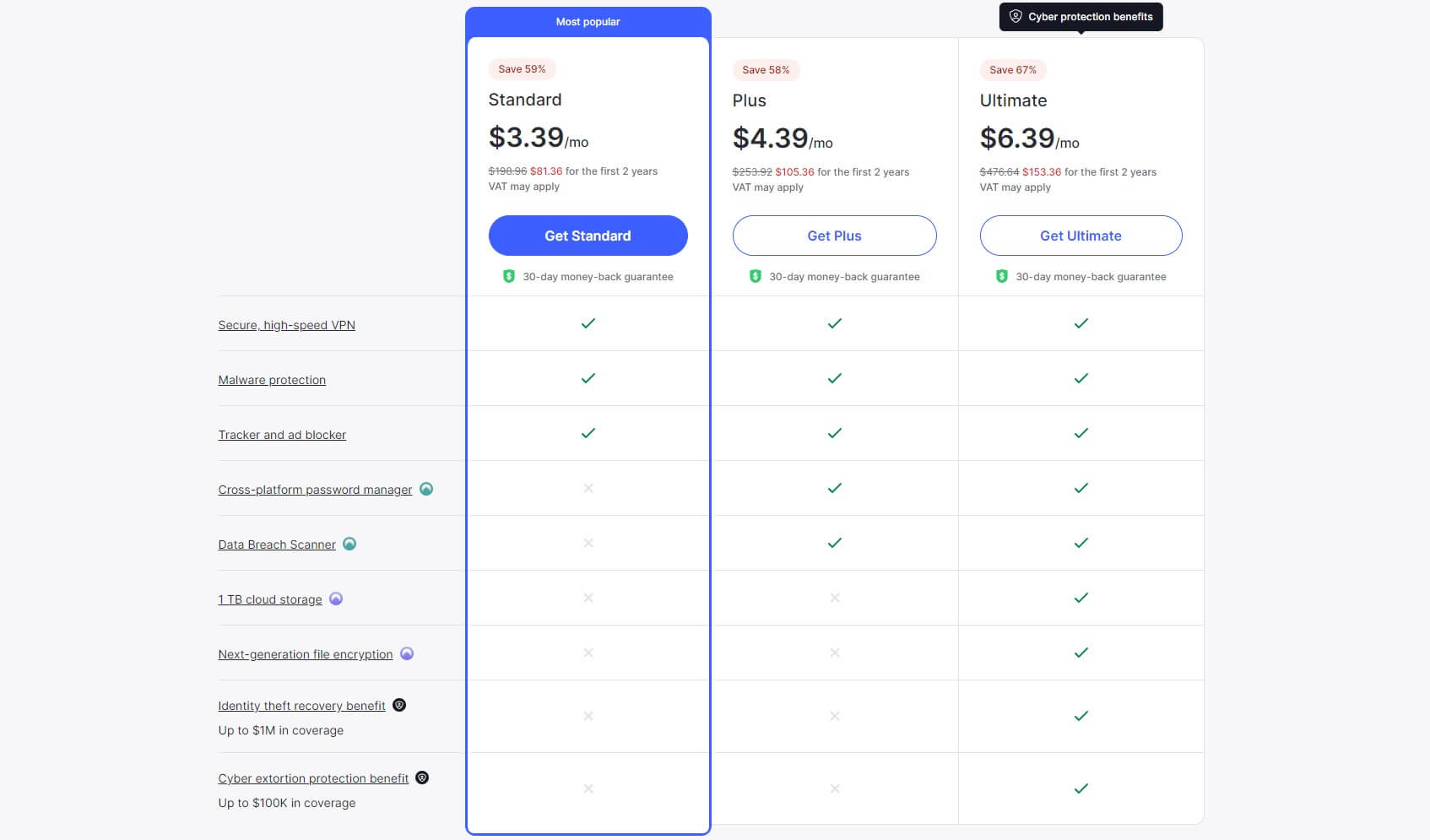
Looking at the price of NordVPN’s plans, we can’t see any number that matches Hotspot Shield. These are clearly more affordable prices where you get more features for less money. You can see that malware protection and ad and tracker blockers are included in every plan.
And if you pay slightly more, you’ll get its NordPass and NordLocker additions which can be very handy. NordVPN has a 30-day money-back guarantee for all subscription plans and unlike Hotspot Shield, you can purchase 2-year, 1-year, and monthly plans if you want.
The plans displayed above are 2-year and the price is, of course, higher for annual and monthly plans. However, NordVPN is always more affordable than its overpriced rival. That can be seen in its annual plan pricing as well.
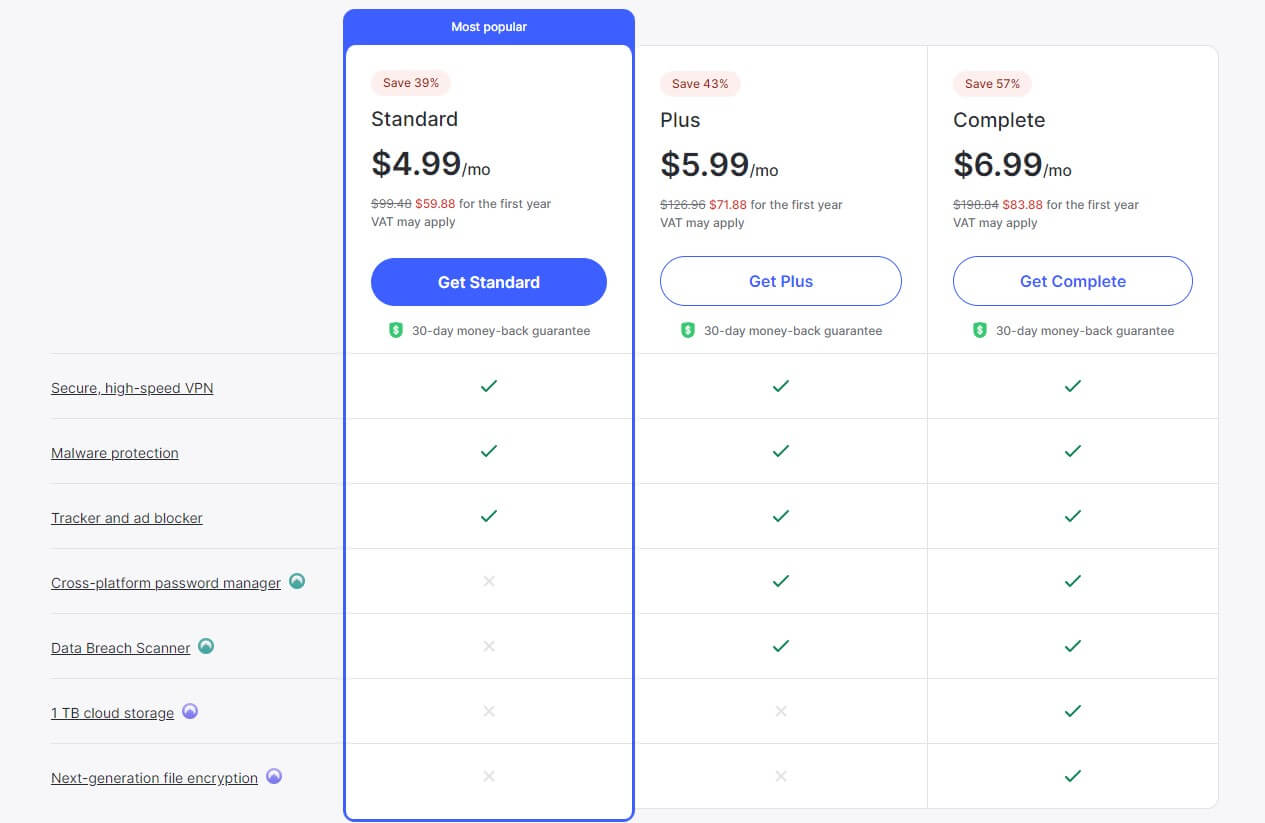
The annual plan of NordVPN starts at $4.99 a month and the Complete plan is $6.99. This plan, however, includes 1 TB of NordLocker cloud storage AND NordPass. Again, the Complete plan is CHEAPER than Hotspot Shield, yet, offers so much more.
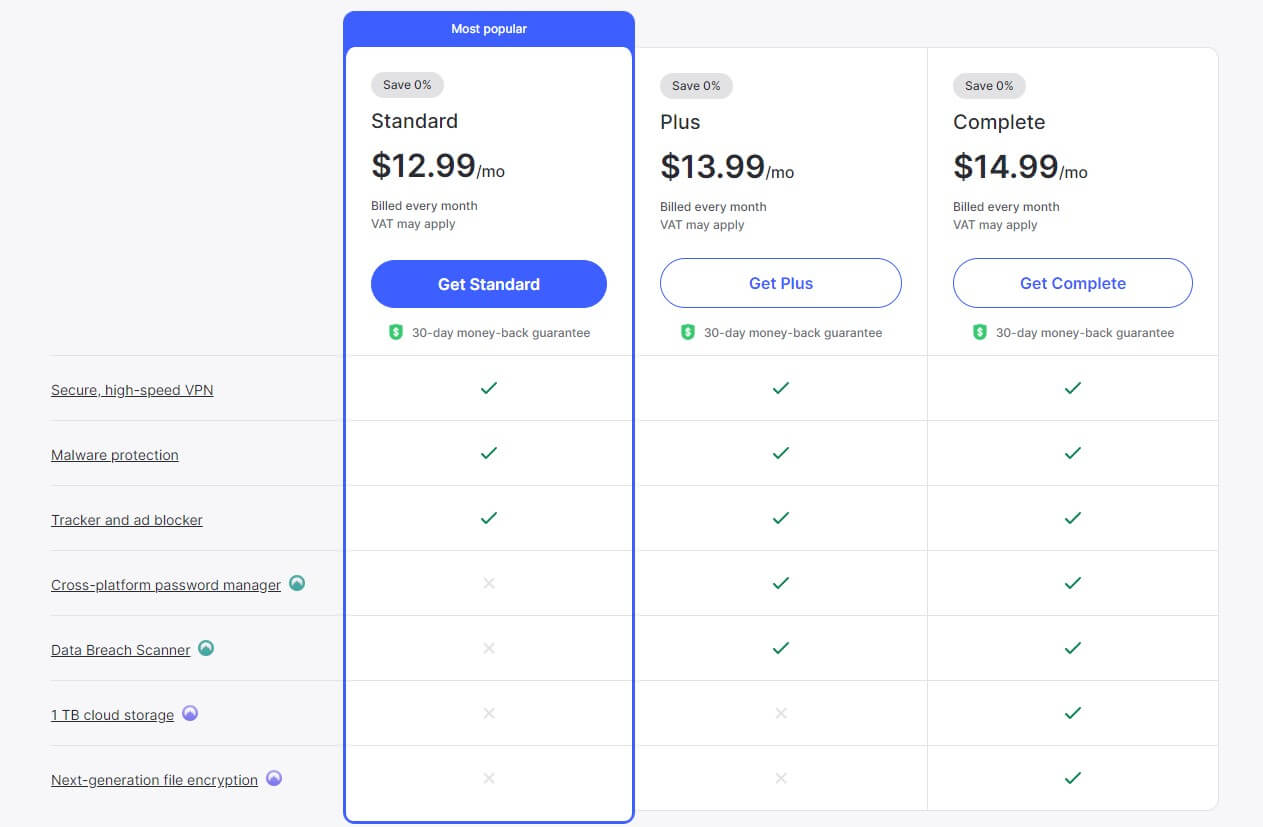
When discussing monthly plans, NordVPN costs the same as Hotspot Shield. Hotspot Shield has a monthly plan at $12.99, which is equivalent to the Standard plan here. Sadly, its Complete plan is $2 more expensive, with the Plus plan costing $1 on top.
However, it doesn’t take a rocket scientist to see that the Standard NordVPN plan trumps Hotspot Shield effortlessly.
Who Wins?
This round of our comparison is rather straight forward and if we do the math, NordVPN WINS. After all, this round is always won by a cheaper VPN no matter the quality. But since the provider is cheaper AND offers better qualities, its victory is even more impactful.
Conclusion: NordVPN Wins!
In the end, this was a smooth win for NordVPN with a score of 9:1 which means we’re talking about a really superior service. Hotspot Shield held its ground in terms of device support and torrenting performance, accompanied by stellar customer support that it can surely brag about.
On a grand scale, however, NordVPN is way ahead of Hotspot Shield. Starting with better-looking apps, more simultaneous connections, much faster speeds, better streaming capabilities, and many other features. Above all, NordVPN is CHEAPER which is one of the most important things to mention.
Why would you pay more and get less with Hotspot Shield? It makes no sense. Plus, the American provider has one fatal flaw in the form of the lack of privacy. Due to its intrusive logging in both paid and free versions, you can’t fully trust this VPN.
It’s based in the US as well, so its 5 Eyes background is always going to plague this otherwise solid service. If it wasn’t for these logging practices and a more expensive price, I feel like Hotspot Shield could’ve been a formidable opponent in this duel.
But, as things stand, Hotspot Shield has nothing to do with NordVPN – it’s in a different, inferior realm. To conclude this Hotspot Shield vs NordVPN comparison for 2025, I’ll just say you should buy the latter without having any second thoughts. You can read our full review of NordVPN to get more details about its service.